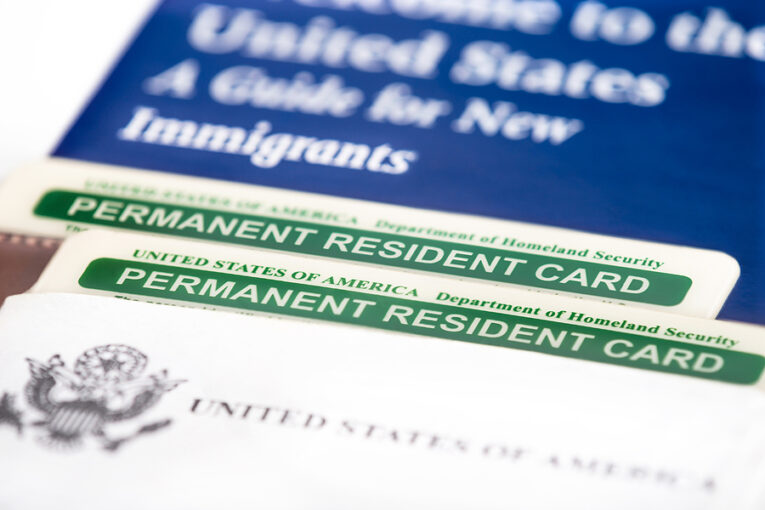Understanding Green Card Renewal
One of the most common questions we receive from clients is about green card renewal. Maintaining your lawful permanent resident status is crucial, and renewing your green card on time is essential to avoid any legal complications. In this comprehensive guide, we’ll dive into the ins and outs of the green card renewal process, ensuring you’re equipped with the knowledge to navigate it smoothly.
Understanding Eligibility for Renewal
Before we delve into the nitty-gritty, let’s clarify who is eligible for green card renewal. If your current green card is set to expire within the next six months or has already expired, you’re eligible to renew it. Additionally, if your green card contains incorrect information due to USCIS administrative errors or changes in your personal information, you can apply for a renewal.
It’s important to note that maintaining a valid green card is not just a formality – it’s a legal requirement. Your green card serves as proof of your lawful permanent resident status, employment authorization, and ability to re-enter the United States after traveling abroad.
The All-Important I-90 Form
The key to initiating your green card renewal is USCIS Form I-90, also known as the Application to Replace Permanent Resident Card. This form is your gateway to maintaining your legal status, and it’s essential to complete it accurately.
You can file Form I-90 electronically through the USCIS Electronic Immigration System (USCIS ELIS) or by mail. Whichever method you choose, make sure to provide all the required personal information, details about your current green card, and the reason for renewal.
If your green card contains incorrect information, you’ll need to provide the correct details during the renewal process.
The Renewal Timeline: Plan Ahead
As experienced immigration attorneys, we cannot stress enough the importance of starting the green card renewal process well in advance. USCIS recommends initiating the process at least six months before your current green card’s expiration date.
Here’s a recommended timeline to keep in mind:
| Months Before Expiration | Action |
| 6 months | Start the application process by filing Form I-90 |
| 5 months | Check for the receipt notice from USCIS |
| 3 months | Respond to any requests for evidence (RFE) |
| 2 months | Attend the biometrics appointment (if scheduled) |
Remember, the processing time can take several months, so starting early is crucial to avoid any lapses in your legal status.
The Cost of Green Card Renewal
Let’s address the elephant in the room – the cost of green card renewal. As of the latest information available, the total cost to renew or replace a green card is $540, which includes a $455 filing fee for Form I-90 and an $85 biometrics services fee.
However, USCIS offers a fee waiver for eligible applicants who cannot afford the renewal fees. To qualify for a waiver, you must demonstrate that you:
- Receive a means-tested benefit
- Have a household income at or below 150% of the Federal Poverty Guidelines
- Are experiencing financial hardship (e.g., unexpected medical bills, emergencies)
If you meet these criteria, you’ll need to file Form I-912 (Request for Fee Waiver) along with your Form I-90, providing sufficient evidence and documentation to support your request.
Preparing for the Renewal Process
Preparation is key when it comes to green card renewal. Here’s a checklist of what you’ll need:
- Your current green card (or any available evidence of your status if it’s lost or stolen)
- Two passport-style photographs
- Supporting documentation for any name changes or updates to your green card information
- Government-issued identification
- Evidence of your status (if your green card is unavailable)
- Name change documents (if applicable)
After filing Form I-90, you’ll receive a notice for a biometrics appointment from USCIS. During this appointment, they’ll collect your fingerprints, photograph, and signature to confirm your identity and conduct background checks. It’s crucial to attend this appointment as scheduled to avoid delays.
Navigating the Application Process
When it comes to submitting your green card renewal application, you have two options: online submission or mail submission.
Online Submission:
- Submit through the USCIS Electronic Immigration System (USCIS ELIS)
- Receive immediate confirmation of your submission
- Easily track your application status
- Quicker communication with USCIS for any additional requests or updates
Mail Submission:
- Mail your completed Form I-90 to the designated filing location listed on the USCIS website
- Use a trackable mailing service to ensure safe delivery and confirm receipt by USCIS
Regardless of the submission method, ensure your application is complete and includes all required documentation to prevent unnecessary delays.
Responding to Requests for Evidence (RFE)
During the review process, USCIS may request additional information or clarification through a Request for Evidence (RFE). Responding promptly and thoroughly to any RFEs is crucial to avoid processing delays or even denial of your application.
When responding to an RFE:
- Read the request carefully and provide all the information asked for
- Include a copy of the RFE notice with your response
- Organize your response clearly, using labels or tabs if necessary
- Submit your response by the deadline given in the RFE
Failing to respond or providing an incomplete response may result in the denial of your green card renewal application.
Avoiding Common Mistakes
As an immigration attorney, I’ve witnessed numerous clients encounter challenges due to avoidable mistakes during the green card renewal process. Here are some common pitfalls to watch out for:
Timely Submission: Missing the renewal deadline can lead to a lapse in your legal status, potential legal complications, and the accrual of unlawful presence within the United States. Submit your Form I-90 at least six months before your current green card expires.
Accurate and Complete Information: Using an outdated version of Form I-90, providing incorrect information, or submitting an illegible or incomplete application can result in the denial of your renewal. Double-check all entries and ensure that all required supporting documents are attached before submission.
Attending Scheduled Appointments: USCIS may require you to attend a biometrics appointment. Missing this appointment without proper notice can be interpreted as abandonment of your renewal application, affecting your lawful status. If you cannot make the scheduled appointment, contact USCIS immediately to reschedule.
Consequences of Not Renewing
Failing to renew your green card can have severe implications for your legal status and daily life in the United States. Here are some potential consequences:
- Loss of Lawful Permanent Resident Status: Neglecting to renew your green card can result in the loss of your lawful permanent resident status, potentially leading to deportation proceedings.
- Travel Restrictions: An expired green card may prevent you from re-entering the United States after traveling abroad, as you’ll need to obtain a returning resident visa through a cumbersome and uncertain process.
- Employment Limitations: Employers are required to verify the work authorization of all employees, and an expired green card may not be considered valid proof, preventing you from legally working.
- Difficulty Accessing Government Benefits: Certain government benefits may require valid proof of your permanent residency, which an expired green card may not provide.
As you can see, the consequences of not renewing your green card can be far-reaching and disruptive to your life in the United States.
Seeking Professional Assistance
While the green card renewal process can be navigated independently, there are situations where seeking professional assistance from an immigration attorney is advisable:
- If you’ve had legal issues or changes in your immigration status since your original green card was issued
- If you have a criminal record or have been involved in immigration proceedings that may affect your eligibility
- If your previous immigration applications have been denied or encountered complications
- If you’ve spent a significant amount of time outside the United States, potentially impacting your continuous residency status
- If there are errors or complications due to name changes or updates to your green card information
An experienced immigration attorney can provide personalized guidance tailored to your unique circumstances, ensuring a smoother renewal process and helping you navigate any potential legal hurdles.
Additionally, the U.S. Citizenship and Immigration Services (USCIS) offers a wealth of resources and tools to assist with the green card renewal process. These include:
- Detailed instructions and FAQs for Form I-90
- Online account setup for electronic submission and application tracking
- Information on fee waivers and eligibility criteria
- Educational materials on the consequences of not renewing your green card on time
Utilizing these resources in conjunction with professional legal assistance can make the green card renewal process significantly smoother and more efficient.
Conclusion
Maintaining your lawful permanent resident status in the United States is a privilege that should not be taken lightly. By understanding the green card renewal process and following the necessary steps, you can ensure a seamless transition to continued legal residency.
Don’t hesitate to reach out for personalized assistance or to explore additional resources on topics such as how to get a green card, the green card lottery, green card priority dates, and green card sponsorship. Your journey to permanence is our priority.





